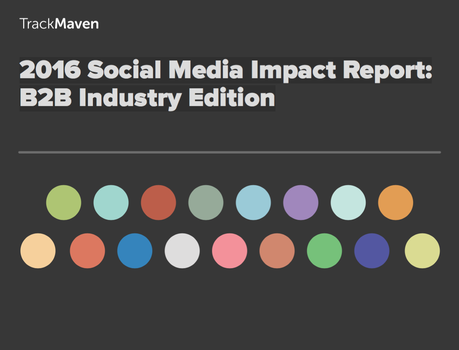
TrackMaven measures the impact of social media on a B2B brand.
You can learn a great deal by studying the best. Digital marketing software provider TrackMaven released its 2016 Social Media Impact Report: B2B Industry Edition in late March, revealing some key statistics in the world of B2B brand media. The organizations analyzed 12 months of content from 316 leading B2B brands in 17 industries on five key social networks - Facebook, Instagram, LinkedIn, Pinterest, and Twitter. The report provides insight into what generates the most impact on specific industries, letting brands see how they measure up against industry benchmarks.
TrackMaven also uncovered that there are absolutes when it comes to social media. There is a broad range in the use and impact of social media for B2B brand marketers.
Follower Growth and Engagement Rates
Two important metrics for social media marketers are follower growth and level of engagement. According to TrackMaven, biotech, engineering and financial services are in enviable positions with high engagement ratios and percentage of fan growth. This implies that these brands are growing their audience with meaningful content.
Overall, biotech brands have the highest engaged audience on social media at a rate of 1.25%. Machinery manufacturers, on the other hand, actually know how to grow their audience. The usual brand in this industry has an average follower growth over 100%, with above average engagement rates.
Although software brands are great at attracting followers, with follower growth of 82%, they suffer from anaemic engagement rates of 0.26%. Professional services brands tend to have the largest social media audience overall within the B2B brand genre, with a median of 2.5 million followers across all networks.
The Five Social Media Platforms
LinkedIn is the dominant social media platform for a B2B brand, followed by Facebook, Twitter, Instagram, and Pinterest. Fourteen of the seventeen industries in the TrackMaven report have their largest audience base on LinkedIn. LinkedIn offers large audiences but extremely low engagement rate for B2B brands. Machinery brands had the best engagement rates, but even that was just 1.98 interactions per post per 1,000 followers.
Facebook is popular among computer hardware brands and financial services with an average of 1.2 million likes and 750,000 likes respectively. However, audiences are not highly engaged, placing third overall for B2B brands as a whole. The only exception to this is in the biotech industry where Facebook fans have the second highest engagements rates of 46.97 interactions per post per 1,000.
Twitter has carved out a small place in the B2B brand sphere, specifically with professional services where the average audience is about 500,000. Unfortunately, engagement rates tend to be quite small with less than two interactions per post per 1,000 followers.
Although Instagram audiences may be small, they offer the highest level of engagement at an average of 22.53 interactions per post per 1,000. The exception to this are biotech and financial services industries where engagement is not as favorable.
Next to Instagram, Pinterest surprisingly offers the second highest level of engagement for B2B brands in general in the TrackMaven report. Financial services brands are receiving high levels of engagement at rates of 69.92 per post per 1,000. B2B audiences on Pinterest, however, are quite small. Only professional services and motor vehicle manufacturing have audiences greater than 3,000 on this social media platform.
Smaller social media platforms tend to offer the highest rates of engagement. However, as certain B2B sectors have shown, you can still have high follower growth coupled with significant engagement.
Download the TrackMaven report here.